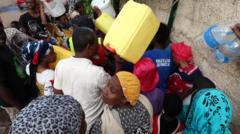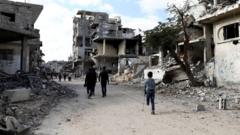An eyewitness account reveals the stark destruction and challenges facing residents of the French territory following one of the worst storms in decades.
Desolation in Mayotte: A Cyclone's Wrath Exposed

Desolation in Mayotte: A Cyclone's Wrath Exposed
BBC's Mayeni Jones reports on Mayotte's dire aftermath post-Cyclone Chido
The devastation is palpable as you fly over Petite-Terre, the smaller island of Mayotte, which was struck by Cyclone Chido. The once-lush landscape is now reduced to a charred wasteland, with coconut trees stripped bare and debris scattered across the terrain. The cyclone unleashed furious winds of up to 220 km/h, leaving the airport's signal tower mangled and the island's few reliable structures in disrepair. A hotel that previously provided electricity and internet access now has a badly damaged roof and shattered windows.
At least 31 lives have been tragically lost, with many more unaccounted for, leading to fears of rising casualties. The French government has declared a state of exceptional natural disaster for Mayotte, one of the poorest regions in France, where many residents inhabit informal housing.
French President Emmanuel Macron arrived with relief supplies on Thursday, visiting Grande-Terre where the devastation mirrored that of Petite-Terre. However, critiques of his administration's funding decisions raised concerns about the consequences of underinvestment in the territory. The ongoing migration debates in France compound the urgency of aid efforts, with some voices arguing against bolstering support lest it attract more migrants.
As the population grapples with rampant destruction, residents are still awaiting crucial supplies such as food and clean water, struggling with shortages that have persisted for almost a week. A heavy rainstorm has further complicated conditions, flooding buildings that lost their roofs.
The French government has implemented a one-month state of emergency aimed at bypassing bureaucratic challenges to expedite crisis response and recovery. François-Noël Buffet, responsible for oversights in overseas territories, emphasized the necessity of deploying extraordinary resources to restore essential services and develop a sustainable recovery plan for Mayotte.
Emergency crews are hastily distributing food and cleaning debris while assisting in the search for missing persons. Health authorities are bracing for possible outbreaks of infectious diseases due to water shortages and rationed supplies. The immediate priority remains to restore functionality to damaged water systems, as half the territory continues to experience power outages.
To mitigate potential looting in the chaos that ensued, a curfew has been instituted, mandating residents to stay indoors for six hours each night. Cyclone Chido has not only devastated Mayotte but also wrought destruction on the African mainland, claiming additional lives in both Mozambique and Malawi.
At least 31 lives have been tragically lost, with many more unaccounted for, leading to fears of rising casualties. The French government has declared a state of exceptional natural disaster for Mayotte, one of the poorest regions in France, where many residents inhabit informal housing.
French President Emmanuel Macron arrived with relief supplies on Thursday, visiting Grande-Terre where the devastation mirrored that of Petite-Terre. However, critiques of his administration's funding decisions raised concerns about the consequences of underinvestment in the territory. The ongoing migration debates in France compound the urgency of aid efforts, with some voices arguing against bolstering support lest it attract more migrants.
As the population grapples with rampant destruction, residents are still awaiting crucial supplies such as food and clean water, struggling with shortages that have persisted for almost a week. A heavy rainstorm has further complicated conditions, flooding buildings that lost their roofs.
The French government has implemented a one-month state of emergency aimed at bypassing bureaucratic challenges to expedite crisis response and recovery. François-Noël Buffet, responsible for oversights in overseas territories, emphasized the necessity of deploying extraordinary resources to restore essential services and develop a sustainable recovery plan for Mayotte.
Emergency crews are hastily distributing food and cleaning debris while assisting in the search for missing persons. Health authorities are bracing for possible outbreaks of infectious diseases due to water shortages and rationed supplies. The immediate priority remains to restore functionality to damaged water systems, as half the territory continues to experience power outages.
To mitigate potential looting in the chaos that ensued, a curfew has been instituted, mandating residents to stay indoors for six hours each night. Cyclone Chido has not only devastated Mayotte but also wrought destruction on the African mainland, claiming additional lives in both Mozambique and Malawi.





















